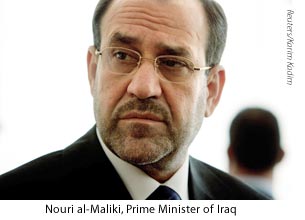New York, September 7, 2006—The Committee to Protect Journalists condemns the decision of the Iraqi government today to close the Baghdad bureau of the Dubai-based satellite channel Al-Arabiya for one month.
The station reported that police entered its Baghdad offices to halt operations after the cabinet chaired by Prime Minister Nouri al-Maliki ordered the suspension.
Al-Arabiya Executive Editor Nabil Khatib told CPJ the channel received a government statement that said its coverage was fomenting “sectarian violence and war in Iraq,” without providing evidence.
“We have never been notified by the government, officially or verbally, that we are violating any clause or any law in Iraq,” Khatib said.
The U.S.-backed government in Iraq has a history of banning news outlets, threatening and harassing journalists and bringing criminal prosecutions against the media.
“The arbitrary closure of Al-Arabiya’s Baghdad bureau flies in the face of the Iraqi government’s promise to uphold freedom of the press,” CPJ Executive Director Joel Simon said. “In a democracy, police do not walk into a television station and stop broadcasts without warning or explanation. We call on Prime Minister Nouri al-Maliki to rescind this ban immediately and to allow Al-Arabiya to resume news coverage of one of the world’s most important news stories.”
In July, al-Maliki threatened to shut down any television station that was deemed to be inciting sectarianism.
In November 2003, the Iraqi Governing Council (IGC), the provisional government appointed by the United States, banned Al-Arabiya from broadcasting in Iraq, accusing the station of incitement after it aired an audiotape purportedly of Saddam Hussein urging Iraqis to resist the U.S.-led occupation of Iraq. The station was allowed to resume broadcasting in late January 2004.
The Iraqi government continues to enforce the closure of the Baghdad bureau of Qatar-based satellite channel Al-Jazeera. It was closed after former Prime Minister Iyad Allawi accused the station in July 2004 of incitement to violence and hatred. Iraqi officials alleged that Al-Jazeera’s reporting on kidnappings had encouraged Iraqi militants, and a government statement on the ban accused Al-Jazeera of being a mouthpiece for terrorist groups, and contributing to instability in Iraq. Al-Jazeera currently operates in the Kurdish-ruled area in northern Iraq.
